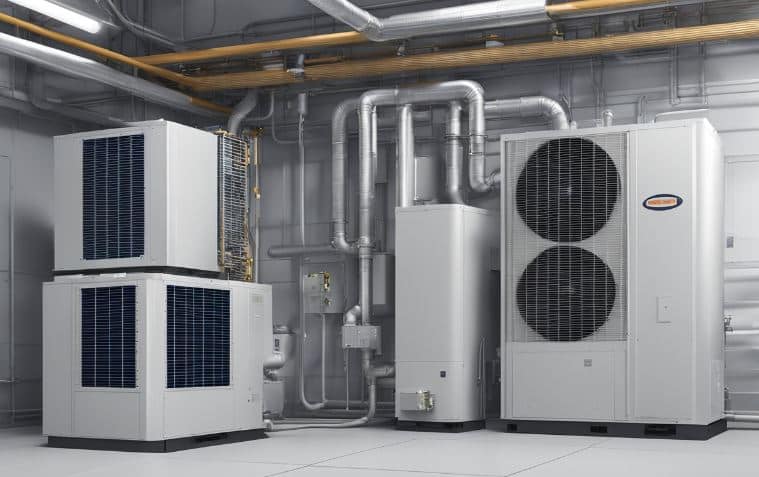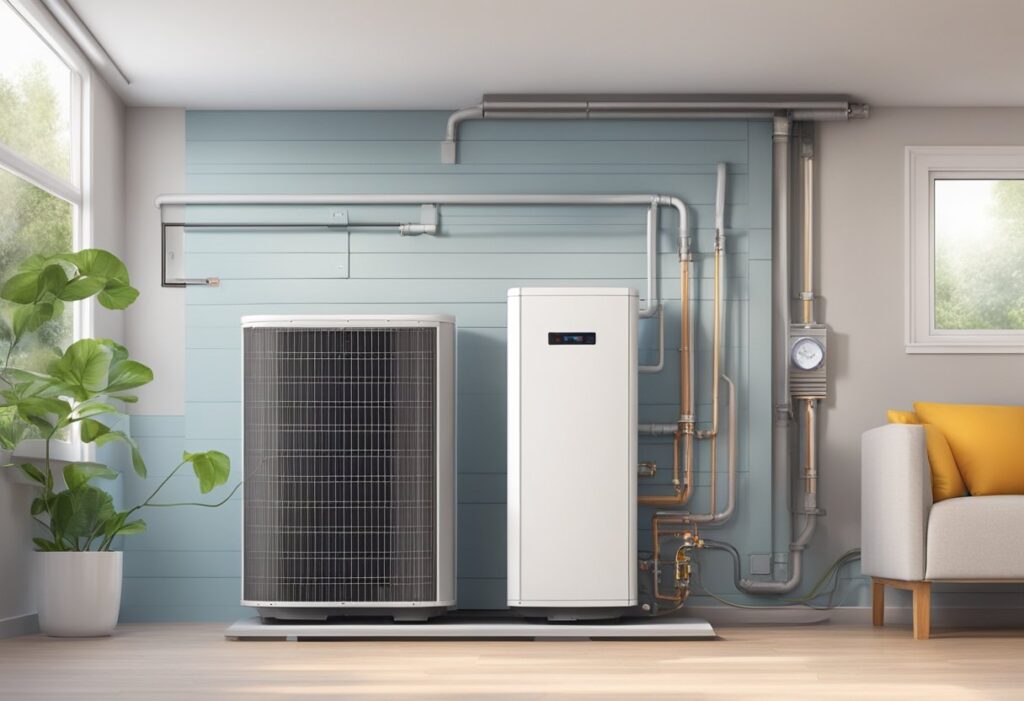
Understanding Hybrid HVAC Systems
Hybrid HVAC systems combine the strength of a gas furnace with the efficiency of an electric heat pump to provide a dual fuel heating solution that adapts to changing temperatures and climate conditions, ensuring effective and efficient home heating.
Components of a Hybrid System
The hybrid heating setup primarily includes two main components:
- Gas Furnace: This furnace typically burns natural gas to produce heat and is a crucial part of the system for when temperatures drop below the heat pump’s efficiency range.
- Electric Heat Pump: This component can both heat and cool a home by moving heat in or out of the house, depending on the weather. It is most efficient during moderate temperature ranges.
These components work together to provide a cost-effective and adaptable heating solution as compared to traditional systems.
How Hybrid Systems Work
Our hybrid HVAC systems operate by intelligently switching between the gas furnace and the electric heat pump to maintain optimal efficiency and comfort.
- Moderate Weather: During milder temperatures, the electric heat pump takes the lead as it can efficiently transfer heat from the outside air into your home, utilizing less energy than the gas furnace.
- Colder Weather: As the outdoor temperature drops, the system seamlessly transitions to the gas furnace, which provides reliable warmth that is not affected by outside conditions.
The switch point at which the system transitions from heat pump to furnace can be adjusted based on climate conditions and personal preferences to ensure the best operational efficiency. Hybrid HVAC systems are a smart choice for those looking to balance comfort with energy use.
Advantages of Hybrid Heating and Cooling
Hybrid heating and cooling systems offer a balance between performance and energy consumption. These systems are designed to provide optimal indoor climate control while reducing energy costs and carbon footprint.
Energy Efficiency and Savings
- Energy Efficiency: Hybrid systems intelligently switch between gas power and electric heat pumps to maintain energy efficiency. By using heat pumps during milder temperatures, we reduce reliance on less efficient gas or electric resistance heating.
- Energy Savings: The strategic operation of a hybrid system leads to considerable energy savings. The system operates at maximum efficiency, making adjustments based on external climate conditions. This efficiency translates into reduced utility bills for consumers.
Increased Comfort and Performance
- Consistent Temperature: We attain a consistent indoor temperature with hybrid systems. By employing advanced controls, these systems adjust to temperature changes, providing continuous comfort.
- Adaptive Performance: Our hybrid system’s ability to select the most effective heating or cooling method means enhanced overall performance. It responds to varying climatic conditions without sacrificing comfort.
Environmental Benefits
- Lower Carbon Footprint: A hybrid system reduces greenhouse gas emissions due to its efficient use of energy. It leans on electricity from renewable sources when possible, contributing to an environmentally friendly heating and cooling solution.
- Sustainable Energy Use: By optimizing the use of the heat pump during suitable conditions, we cut down on fossil fuel consumption. This approach helps in promoting a more sustainable and cost-effective energy solution.
Installation and Maintenance
When we opt for a hybrid HVAC system, we enter into a world of nuanced installation and diligent maintenance. This ensures optimal performance and longevity of our investment.
Professional Installation Considerations
Before implementing a hybrid system, it’s crucial that we select the right HVAC technician. A mishandled installation can lead to inefficiencies and raised costs. We must account for:
- Installation Cost: Detailed quotes should outline labor and components. Prices will vary based on system complexity and our home’s specific needs.
- System Design: Our technician must evaluate our home to install the correct size and type of system. An improperly sized HVAC can lead to inefficiency and a shortened lifespan.
- Ductwork Assessment: Existing ductwork needs inspection for leaks or necessary upgrades to support the new system efficiently.
Regular Maintenance and Repairs
To maintain our hybrid heating system’s efficiency and extend its life, we adhere to a strict maintenance schedule:
- Regular Maintenance: This includes checking filters, inspecting ducts, and verifying that all components function correctly. Ideally, we should schedule inspections biannually.
- Prompt Repairs: Should issues arise, immediate attention prevents minor problems from escalating. Documentation of repairs and maintenance helps keep track of the system’s history.
By prioritizing professional installation and regular maintenance, we effectively safeguard the performance and durability of our hybrid HVAC systems.
Smart Control and Optimization
In this section, we explore the integration of smart control mechanisms in Hybrid HVAC systems which allow for improved efficiency and adaptability to varying climate conditions.

Thermostat Technology
Recent advancements in AI and smart thermostat technologies enable hybrid HVAC systems, including dual fuel heat pumps, to operate with unprecedented precision. We now see thermostats capable of learning our preferences and adjusting the indoor climate without constant manual input. Here’s how the technology contributes to smart control:
- Learning Patterns: Smart thermostats learn our routines and adjust heating and cooling cycles accordingly.
- Remote Adjustments: Users can alter settings anywhere via an app, ensuring they return to a comfortable environment.
Maximizing System Efficiency
To ensure our hybrid HVAC systems, particularly those with dual fuel heat pumps, maintain optimal energy efficiency, smart control systems perform the following functions:
- Efficiency Monitoring: They continuously analyze performance data to maintain system health.
- Function Switching: AI-assisted algorithms determine the most energy-efficient mode—whether using electricity or fossil fuels—by considering the external temperature and internal demand.
These technologies not only allow for energy savings but also equip our hybrid systems to adapt seamlessly to changing climates by switching between functions, thus achieving increased efficiency.
Financial Incentives and Long-term Benefits
In the realm of hybrid HVAC systems, our financial gains materialize through rebates and tax credits initially, followed by significant cost savings over time. This dual advantage makes hybrid systems a prudent investment towards a more sustainable future without straining our wallets.
Rebates and Tax Credits
We can benefit from a variety of financial incentives when we invest in hybrid HVAC systems. Firstly, utility companies often offer rebates to encourage the adoption of energy-efficient technologies. These rebates directly reduce our upfront costs. For instance, purchasing an ENERGY STAR certified hybrid HVAC system may qualify us for these rebates.
Moreover, tax incentives are another substantial benefit. The government extends tax credits to us for integrating eco-friendly appliances into our homes. These incentives not only support our commitment to a greener future but also alleviate the initial financial burden of investing in these systems. It’s essential to consult with a tax professional to ensure we fully capitalize on these available tax credits.
Cost Savings Over Time
Investing in a hybrid HVAC system is synonymous with investing in long-term cost savings. Over time, we typically see a reduction in our heating costs due to the increased efficiency of hybrid systems. A financial breakdown might look like this:
- Year 1: High upfront investment with potential reduction from rebates and tax credits.
- Year 2-5: Gradual recoupment of the initial investment through lower utility bills.
- Year 6 and beyond: Net savings as the system continues to outperform traditional systems in efficiency and durability.
The durability of these systems also means we’re saving money on maintenance and potential replacements. Our initial investment pays dividends as the years pass, reflecting the wisdom of our decision on our bank statements. A properly maintained hybrid HVAC system is a continued source of reliability and cost efficiency, making it easier on our wallet while we enjoy a comfortable home environment.
Frequently Asked Questions
What are the advantages of installing a hybrid HVAC system?
Hybrid HVAC systems offer flexibility in energy consumption by switching between gas and electric heating based on outside temperatures. This optimizes comfort and energy efficiency.
How does a hybrid HVAC system operate compared to a conventional one?
A hybrid system uses an electric heat pump for heating and cooling, automatically switching to a gas furnace when it’s too cold. Conventional systems don’t switch energy sources and may be less efficient.
What are the initial installation costs associated with a hybrid HVAC system?
The upfront cost of a hybrid HVAC system tends to be higher than traditional systems due to the inclusion of both a heat pump and a gas furnace. However, potential rebates and incentives can reduce this cost.
How much can homeowners expect to save on energy bills with a hybrid HVAC system?
Homeowners may see a significant reduction in energy bills. Savings vary, but hybrid systems are designed to choose the most economical heating method, leading to long-term cost efficiency.
Are there specific maintenance requirements for hybrid HVAC systems?
Hybrid HVAC systems require consistent maintenance for both the heat pump and furnace components. Following the manufacturer’s guidelines will ensure optimal performance and lifespan.
What factors should be considered when choosing between a hybrid HVAC system and a standard heat pump?
Climate, energy prices, and the home’s insulation should be considered. In areas with severe winters, a hybrid system could provide better efficiency and reliability compared to a standard heat pump alone.

